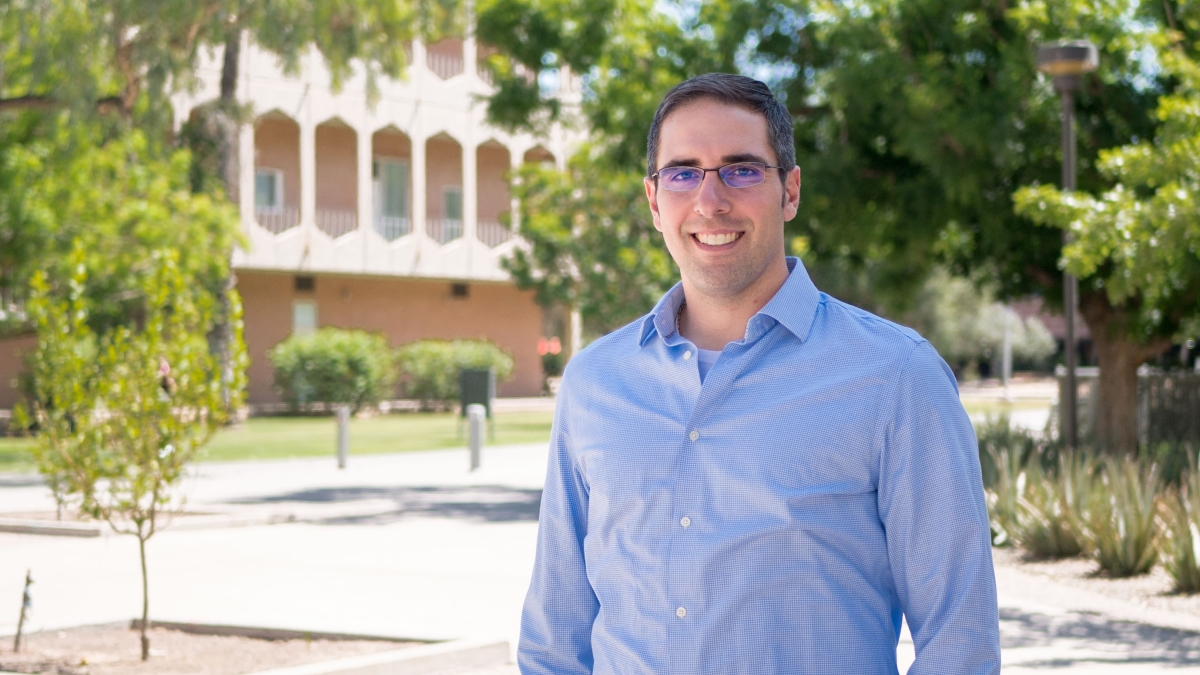ASU resilience researcher Frank Infurna promoted to associate professor

Frank Infurna, who was recently promoted to associate professor by the Arizona State University Department of Psychology, is a leading researcher in the study of resilience, or how people respond to adversity, failure and challenges in life. Photo by Robert Ewing
The promotion from assistant to associate professor is a trying endeavor during which researchers have to establish a reputation as a leader in their field over a period of five to seven years. Success as an assistant professor requires being able to handle adversity, failure and challenges. And in one case, study how other people do.
Frank Infurna, who was recently promoted to associate professor by the Arizona State University Department of Psychology, is a leading researcher in the study of resilience.
Infurna, who leads the Healthy Aging and Life Events lab in the ASU psychology department, said he has always been interested in health and well-being in adulthood and old age. His current research focuses on resilience in adults ages 50 to 65, an age-range which researchers call “midlife” and that is not well studied by developmental psychologists.
“When people typically think of midlife, they think of a ‘midlife crisis’ like the neighbor down the street who buys a red sports car when they turn 50. The midlife crisis is largely myth. What we are finding is that ‘midlife is madness’ because people ages 50 to 65 might still be working, married, have kids at home or have grandchildren, and some might even be a caregiver for a parent or in-law,” Infurna said.
Together with Suniya S. Luthar, ASU Foundation Professor of psychology, and Kevin Grimm, professor of psychology, Infurna is in the middle of a long-term study of almost 350 people ages 50 to 65. The study is funded by the John Templeton Foundation and is called “Pathways to Character.” Participants agreed to complete a survey once a month for two years.
“In addition to asking about their health and well-being, we ask questions that measure character traits like empathy, altruism, gratitude, humility, spirituality and open-mindedness,” Infurna said. “We also ask about any adverse life events that have happened.”
Because the participants complete surveys monthly, the researchers can construct how changes in character traits like empathy or humility change after a difficult event like losing a job or a close family member or friend passing away. The design of the study allows researchers to study how people respond to adversity as it happens, instead of surveying people about how they responded to past difficulties.
“The majority of research on post-traumatic growth is usually retrospective, or after the fact,” Infurna said. “We are getting information about how people change following adversity in close to real time.”
Participants are compensated $10 for each survey they complete. The researchers gave them the option of donating all or half of their compensation to one of three charities: the Wounded Warrior Project, Camp Kesem or the Make-a-Wish Foundation. Twenty percent of the participants chose to donate their compensation, and $4,000 has been donated across the three charities so far.
From a Berlin coffee shop to the Arizona desert
Infurna completed his doctorate degree at Pennsylvania State University but finished writing his dissertation at coffee shops in Germany because his adviser moved to Humboldt University of Berlin.
“Everyone would stare at me because apparently in Germany when you go to a coffee shop, you are supposed to just enjoy yourself and not bring a laptop to do work,” he said.
After many cups of coffee, Infurna’s dissertation was finished, and he decided to stay in Berlin to work as a postdoctoral researcher, continuing the work he started with his graduate adviser.
Infurna flew to Arizona for his job interview with the ASU Department of Psychology on April 1, 2013, and it was snowing in Berlin.
“I left a place with snow on the ground, and it was 90 degrees and sunny in Tempe,” Infurna said. “I thought this place had to be awesome, and I was right.”
Infurna joined the ASU psychology department faculty in the fall of 2013.
“Frank Infurna is a highly valuable member of our department. His research, exploring the nature of resilience to major life stressors, and the psychological and social factors that predict healthy aging, is technically sophisticated, enabling him to ask questions and generate novel insights. Not surprisingly, his scholarly reputation is growing rapidly,” said Steven Neuberg, ASU Foundation Professor of psychology and department chair. “Moreover, as a teacher, Frank is showing an impressive ability to mentor his undergraduate students to success. We’re thrilled that he has been promoted to associate professor with tenure and look forward to having him continue to be an important part of our psychology family.”
More Science and technology

Hack like you 'meme' it
What do pepperoni pizza, cat memes and an online dojo have in common?It turns out, these are all essential elements of a great…

ASU professor breeds new tomato variety, the 'Desert Dew'
In an era defined by climate volatility and resource scarcity, researchers are developing crops that can survive — and thrive —…

Science meets play: ASU researcher makes developmental science hands-on for families
On a Friday morning at the Edna Vihel Arts Center in Tempe, toddlers dip paint brushes into bright colors, decorating paper…

